The AMD Zen and Ryzen 7 Review: A Deep Dive on 1800X, 1700X and 1700
by Ian Cutress on March 2, 2017 9:00 AM ESTBenchmarking Performance: CPU Web Tests
One of the issues when running web-based tests is the nature of modern browsers to automatically install updates. This means any sustained period of benchmarking will invariably fall foul of the 'it's updated beyond the state of comparison' rule, especially when browsers will update if you give them half a second to think about it. Despite this, we were able to find a series of commands to create an un-updatable version of Chrome 56 for our 2017 test suite. While this means we might not be on the bleeding edge of the latest browser, it makes the scores between CPUs comparable.
SunSpider 1.0.2 [link]
The oldest web-based benchmark in this portion of our test is SunSpider. This is a very basic javascript algorithm tool, and ends up being more a measure of IPC and latency than anything else, with most high performance CPUs scoring around about the same. The basic test is looped 10 times and the average taken. We run the basic test 4 times.
Mozilla Kraken 1.1 [link]
Kraken is another Javascript based benchmark, using the same test harness as SunSpider, but focusing on more stringent real-world use cases and libraries, such as audio processing and image filters. Again, the basic test is looped ten times, and we run the basic test four times.
Google Octane 2.0 [link]
Along with Mozilla, as Google is a major browser developer, having peak JS performance is typically a critical asset when comparing against the other OS developers. In the same way that SunSpider is a very early JS benchmark, and Kraken is a bit newer, Octane aims to be more relevant to real workloads, especially in power constrained devices such as smartphones and tablets.
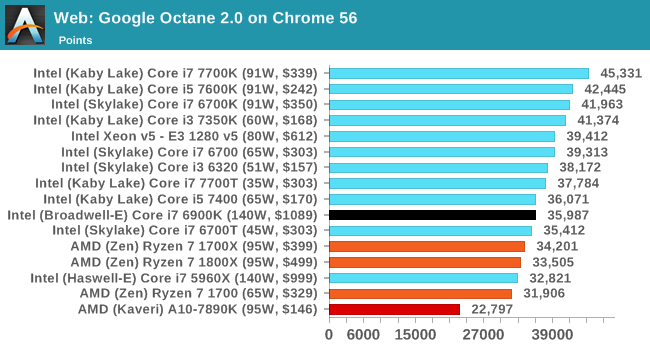
WebXPRT 2013 and 2015 [link]
While the previous three benchmarks do calculations in the background and represent a score, WebXPRT is designed to be a better interpretation of visual workloads that a professional user might have, such as browser based applications, graphing, image editing, sort/analysis, scientific analysis and financial tools. Web2013 is the older tool, superceded by Web2015, however both still are highly relevant for high-performance web applications today.
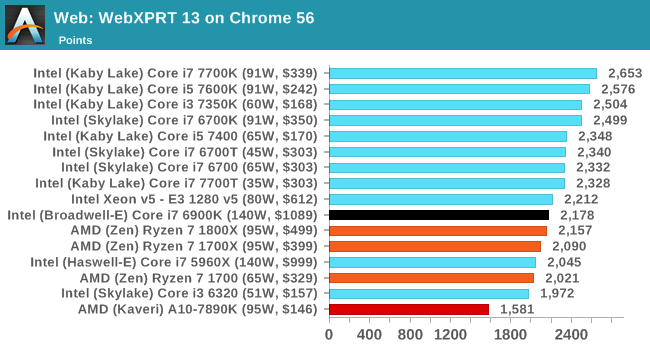
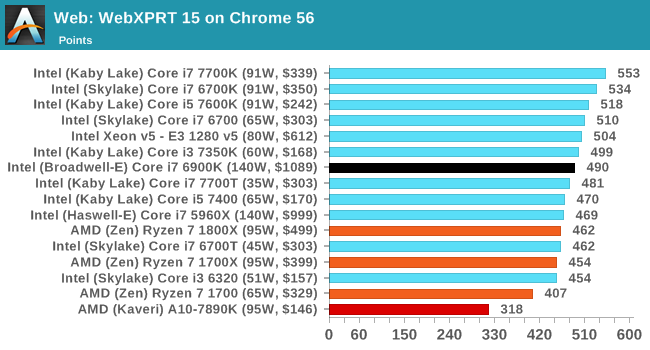


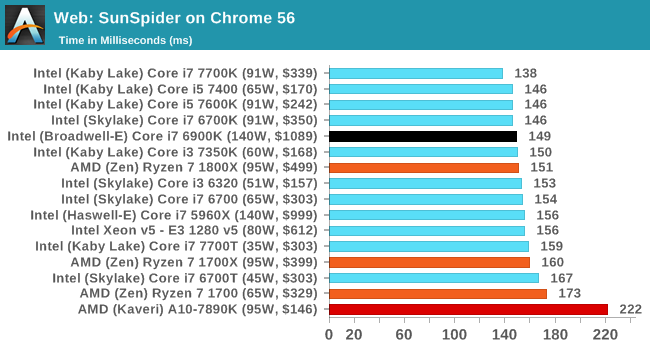
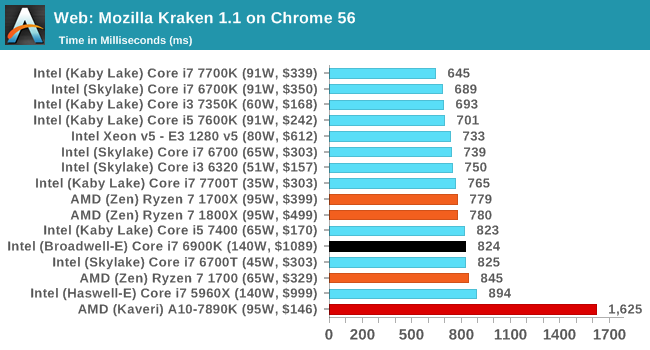








574 Comments
View All Comments
FriendlyUser - Thursday, March 2, 2017 - link
True. The 1600X will be competitive with the i5 at gaming and probably much faster in anything multithreaded. The crucial point is the price... $200 would be great.MrSpadge - Thursday, March 2, 2017 - link
"Ryzen will need to drop in price. $500 1800x is still too expensive. According to this even a 7700k @ $300 -$350 is still a good choice for gamers."That's what the 1700X is for.
lilmoe - Thursday, March 2, 2017 - link
+1And for that, I'd say the 1700 (non-x) is the best consumer CPU available ATM. BUT, if someone just wants to game, I'd say get the Core i5... For me though, screw Intel. Never going them again.
fanofanand - Thursday, March 2, 2017 - link
The 1700 is the sweet spot for anyone not trying to eek out a few more fps or drop their encode/decode times by a couple of seconds. To save $170 and lose a couple hundred mhz, I know which chip seems like the best all-around for price/performance and that's the 1700.lilmoe - Thursday, March 2, 2017 - link
Yep. You get both efficiency and performance when needed. This should allow for super quiet and very performant builds. Just take a look at the idle system power draw of these chips. Super nice.Everything is going either multi-threaded or GPU accelerated, even compiling code. What I'm really waiting for is Raven Ridge. I've got lots of stock $$ and high hopes for a low power 4-6 core Zen APU, with HBM and some bonus blocks for video encode (akin to Quicksync). I have a feeling they'll be much better for idling power and have better support for Microsoft's connected standby.
khanikun - Friday, March 3, 2017 - link
i5 is a good gamer and all around cpu for majority of users. If all you plan to do is game and a tight budget, the i3 7350k is a great cpu for just that. Once the workload goes a bit more multithreaded, that's where you'll want to move to an i5.Valis - Friday, March 3, 2017 - link
I game now and then, but I do a lot of other things too. Video rendering, Crypto coins, Folding @ home, VM, etc. So any Zen, perhaps even 4 Core later thins year with a good GPU will suit me fine. :)nos024 - Thursday, March 2, 2017 - link
So the 1800x is pointless?lilmoe - Thursday, March 2, 2017 - link
I don't think pointless is the right word. I'd say it's the worse value for dollar of the three.tacitust - Thursday, March 2, 2017 - link
Not at all pointless if you do a lot of video transcoding or other CPU intensive tasks well suited to multiple cores. The price premium is still for the 1800x is way lower than the price premium for the Intel processors.